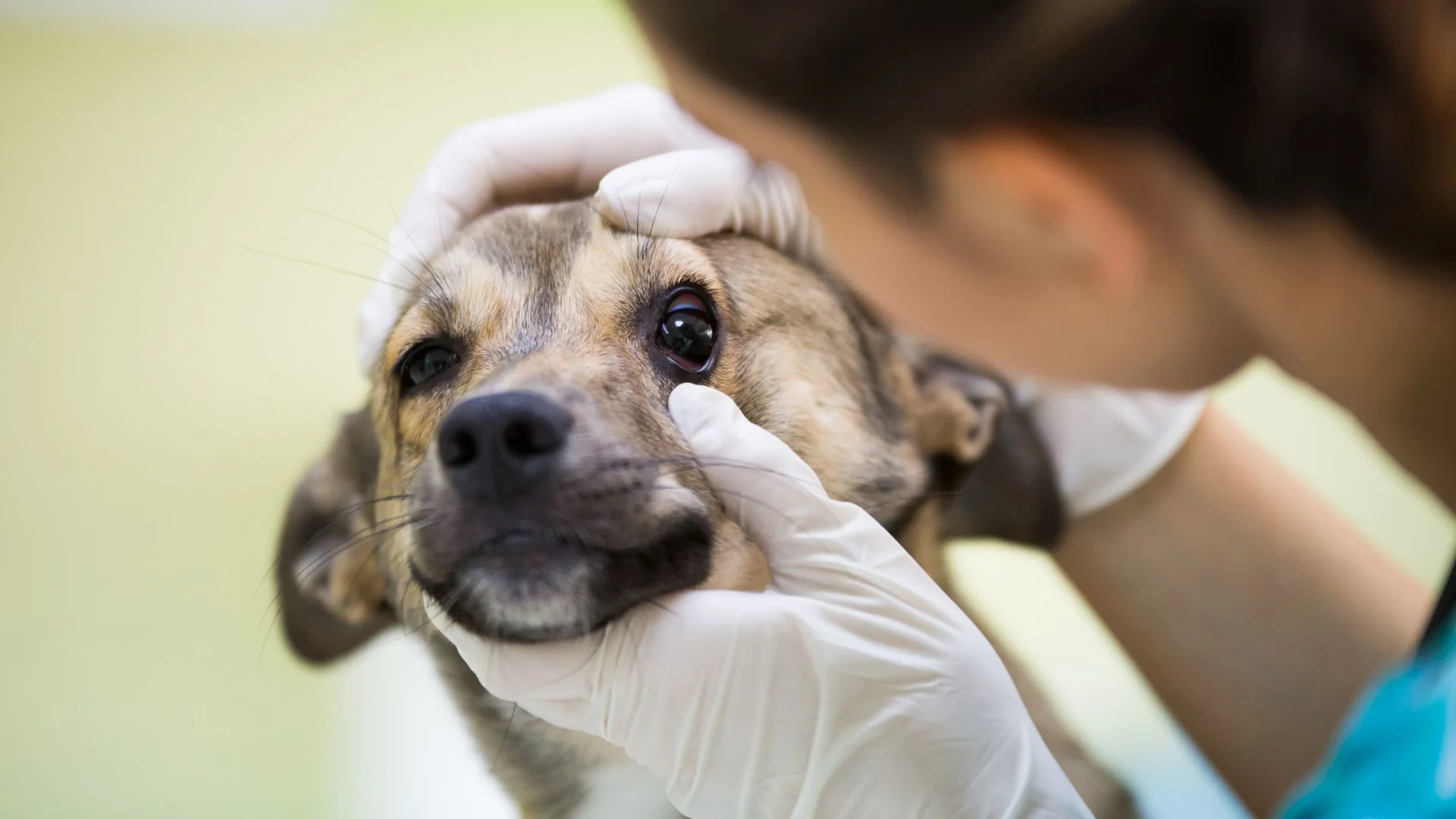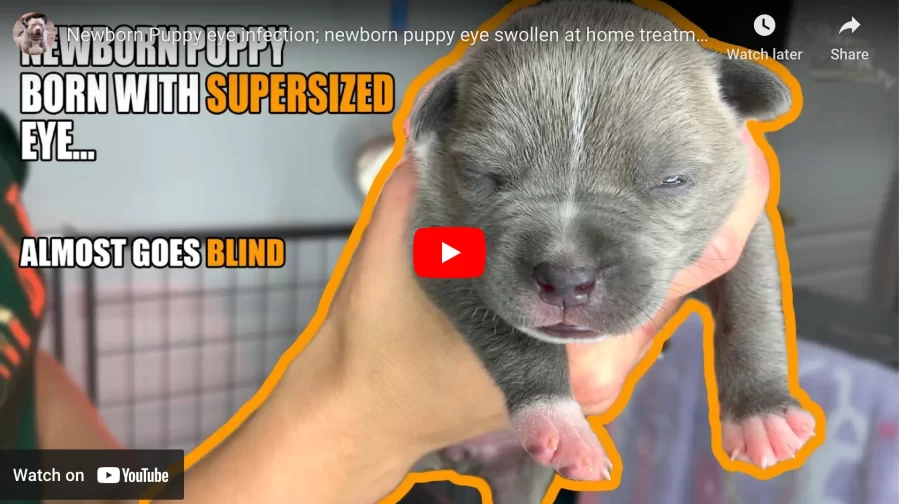Wondering how to treat dog eye infection without a vet? As a pitbull puppy owner, you know that your furry friend's health is paramount. One of the most common health issues that can affect both puppies and large dogs is eye infections. While veterinary care is always the best option for serious conditions, there are times when you might need to address minor eye infections at home.
This comprehensive guide will walk you through the process of identifying and treating dog eye infections without a vet, focusing on puppies and large breeds.
Types of Dog Eye Infections
Before diving into dog eye infection treatment options, it's essential to understand the different types of eye infections that commonly affect dogs:
- Conjunctivitis in dogs (Pink Eye): an inflammation of the conjunctiva, the tissue that covers the eye and lines the eyelid.
- Keratitis: This infection affects the cornea, the clear outer layer of the eye.
- Uveitis: An inflammation of the uvea, the middle layer of the eye that includes the iris.
- Blepharitis: An inflammation of the eyelids, often causing redness and swelling.
Each of these conditions can affect both puppies and large dogs, though some breeds may be more susceptible to certain types of infections.
What are the signs of eye infection in puppies?
Recognizing the signs of an eye infection is crucial for early intervention. In puppies, you should look out for:
- Redness and swelling in the eye area
- Discharge that can range from clear and watery to thick and yellowish-green
- Squinting or excessive blinking
- Pawing at the eye
- Sensitivity to light
- Partially closed eyes
Puppies may be more prone to eye infections due to their developing immune systems, so it's important to monitor them closely.
How can I tell if my large dog has an eye infection?

Large dogs can experience eye problems similar to those seen in puppies. These issues often manifest through a range of noticeable symptoms that pet owners should be aware of.
Common signs of eye problems in large dogs include;
- Redness and swelling in and around the eye
- Discharge from the eye
- Increased blinking or squinting
- Rubbing their face against furniture or with their paws
- Changes in behavior, such as avoiding bright lights or seeming more lethargic
It's important to note that large breeds may be more susceptible to specific eye conditions. For example, they can be prone to issues like cherry eye (a prolapsed third eyelid gland) or entropion (inward rolling of the eyelid). These conditions can make large dogs more vulnerable to eye infections and other related problems.
Is eye discharge in dogs always a sign of infection?
Some dog breeds naturally produce more eye discharge than others, so a small amount isn't always cause for concern. Normal eye discharge is typically clear or slightly white and doesn't accumulate excessively.
However, there are situations where eye discharge can indicate a problem. If you notice that your dog's eye discharge is excessive, discolored, or accompanied by other symptoms such as redness or swelling, it could be a sign of an infection or other underlying issue.
In these cases, it's best to consult with a veterinarian. They can examine your dog's eyes and determine whether the discharge is normal for your pet's breed or if it requires treatment.
Why is my dog's eye red and swollen?
Redness and swelling in a dog's eye can be caused by various factors, including:
- Infections (bacterial, viral, or fungal)
- Allergies
- Injuries or trauma to the eye
- Foreign objects in the eye
- Underlying health conditions like glaucoma or uveitis
If these symptoms persist for more than a day or are accompanied by other signs of discomfort, it's best to consult a veterinarian.
How do eye infections differ between puppies and adult dogs?
While the types of infections are similar, there are some differences:
- Susceptibility: Puppies may be more susceptible to infections due to their developing immune systems.
- Cause: Puppies are more likely to get infections from play or exploration, while adult dogs might develop infections due to underlying health issues.
- Symptoms: Puppies may show more pronounced symptoms due to their smaller size and less developed tolerance for discomfort.
- Treatment: The approach to treatment may differ, with puppies potentially needing more gentle or diluted treatments.
Are certain dog breeds more prone to eye infections?
Yes, certain breeds are more predisposed to eye infections due to their physical characteristics:
- Breeds with prominent eyes (like Pugs, Bulldogs, or Boston Terriers) are more exposed to environmental irritants.
- Dogs with long hair around the eyes (like Shih Tzus or Lhasa Apsos) can trap bacteria and debris near the eye.
- Breeds prone to tear duct issues (like Poodles or Cocker Spaniels) may have more frequent eye problems.
What's the difference between conjunctivitis and other eye infections in dogs?
Conjunctivitis specifically affects the conjunctiva, the tissue that covers the eye and lines the eyelid. Other eye infections may involve different parts of the eye:
- Conjunctivitis: Redness, swelling, and discharge from the eye, but usually doesn't affect vision severely.
- Keratitis: Affects the cornea and can cause cloudiness, potentially impacting vision.
- Uveitis: Inflammation of the middle layer of the eye, which can be more serious and affect vision.
- Blepharitis: Inflammation of the eyelids, which may not directly affect the eye itself but can cause discomfort.
How long does it take for a dog eye infection to clear up?
The duration of an eye infection can vary depending on the cause and severity:
- Mild infections: With proper treatment, these often improve within 3-5 days.
- Moderate infections: May take 7-14 days to fully resolve.
- Severe infections: Can take several weeks to heal completely and may require ongoing veterinary care.
It's important to complete the full course of any prescribed treatment, even if symptoms improve quickly.
What is the best home remedy for dog eye infection?
While professional veterinary care is always recommended for eye infections, some mild cases can be managed at home:
- Saline solution eye washes: Help flush out irritants and soothe the eye.
- Warm compresses: Can reduce swelling and provide comfort.
- Gentle cleaning: Use a soft, damp cloth to remove discharge around the eye.
- Keeping the eye area clean and dry: Prevent further irritation or infection.
Remember, these remedies are for mild cases only. If symptoms persist or worsen, seek veterinary care immediately.
Can I use human eye drops on my dog?
It's not recommended to use human eye drops on dogs without veterinary approval. Here's why:
- Different pH levels: Dog eyes have a different pH than human eyes.
- Harmful ingredients: Some ingredients safe for humans may be harmful to dogs.
- Incorrect dosage: The concentration of active ingredients may be inappropriate for dogs.
- Masking symptoms: Using the wrong treatment may hide symptoms of a more serious condition.
Always consult with a veterinarian before using any eye medications on your dog.
How to make a saline solution for cleaning dog eyes?
To make a safe saline solution for your dog's eyes:
- Mix 1/4 teaspoon of salt with 1 cup of boiled (then cooled) water.
- Stir until the salt is completely dissolved.
- Allow the solution to cool to room temperature before use.
- Use fresh solution for each application to prevent contamination.
Use this solution to gently clean around the eye or as an eye wash under veterinary guidance.
What is the most effective way to treat dog eye infection at home?
For mild infections, a combination approach is often most effective:
- Clean the eye area gently with a saline solution 2-3 times daily.
- Apply warm compresses for 5-10 minutes, 2-3 times a day.
- Keep the area around the eye clean and dry.
- Prevent your dog from rubbing or pawing at the eye.
- Monitor the infection closely and seek veterinary care if symptoms worsen or don't improve within 48 hours.
How to prevent eye infections in dogs?
Prevention is key when it comes to eye infections. Here are some strategies:
- Regular eye cleaning: Gently wipe around your dog's eyes daily with a clean, damp cloth.
- Grooming: Keep long hair around the eyes trimmed to prevent irritation.
- Hygiene: Maintain a clean living environment for your dog.
- Nutrition: Provide a balanced diet rich in vitamins A, C, and E to support eye health.
- Regular check-ups: Have your dog's eyes examined during routine veterinary visits.
- Prompt attention: Address any eye issues as soon as you notice them.
Is it cheaper to treat dog eye infections at home or at the vet?
While home treatments may seem less expensive initially, professional veterinary care is crucial for proper diagnosis and treatment, especially for severe or persistent infections. Here's why:
- Accurate diagnosis: Vets can determine the exact cause of the infection.
- Appropriate treatment: Professional care ensures your dog receives the right medication and dosage.
- Preventing complications: Early professional treatment can prevent more serious and costly issues.
- Long-term savings: Proper treatment from the start can prevent recurring infections.
Remember, while mild cases might be manageable at home, ignoring a serious infection could lead to more costly treatments in the long run and potential damage to your dog's eye health.
Conclusion
while many mild dog eye infections can be treated at home, it's crucial to monitor your pet's condition closely and seek veterinary care when necessary. By understanding the signs of eye infections and knowing how to address them, you can help keep your puppy or large dog's eyes healthy and bright.
Remember, when in doubt, always consult with a professional to ensure the best care for your furry friend.
I am a highly skilled content writer and SEO expert with a passion for helping small businesses succeed in the digital world. With my extensive knowledge of the latest SEO techniques and strategies, I have successfully assisted numerous clients in improving their website rankings, generating more leads, and driving a significant increase in website traffic.
As a professional content writer and SEO expert, I am confident in my ability to contribute significantly to the success of small businesses. If you are seeking a results-driven, highly skilled digital marketer who can help you increase your ranking, convert new leads, and see a substantial improvement in website traffic, I would welcome the opportunity to collaborate with you.
Website: https://manmadewebsites.com/
Email: hello@digitalmarketingchap.com

